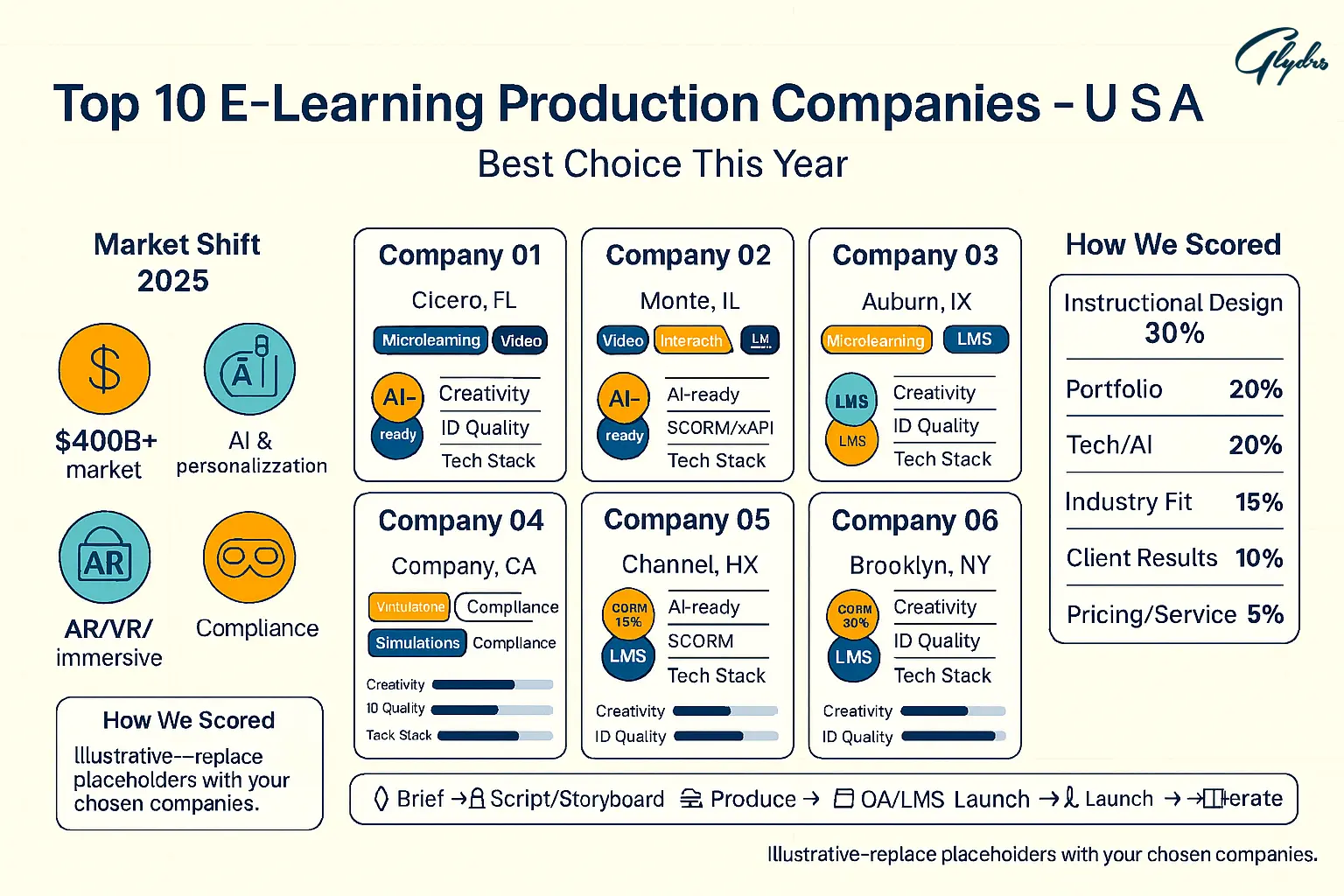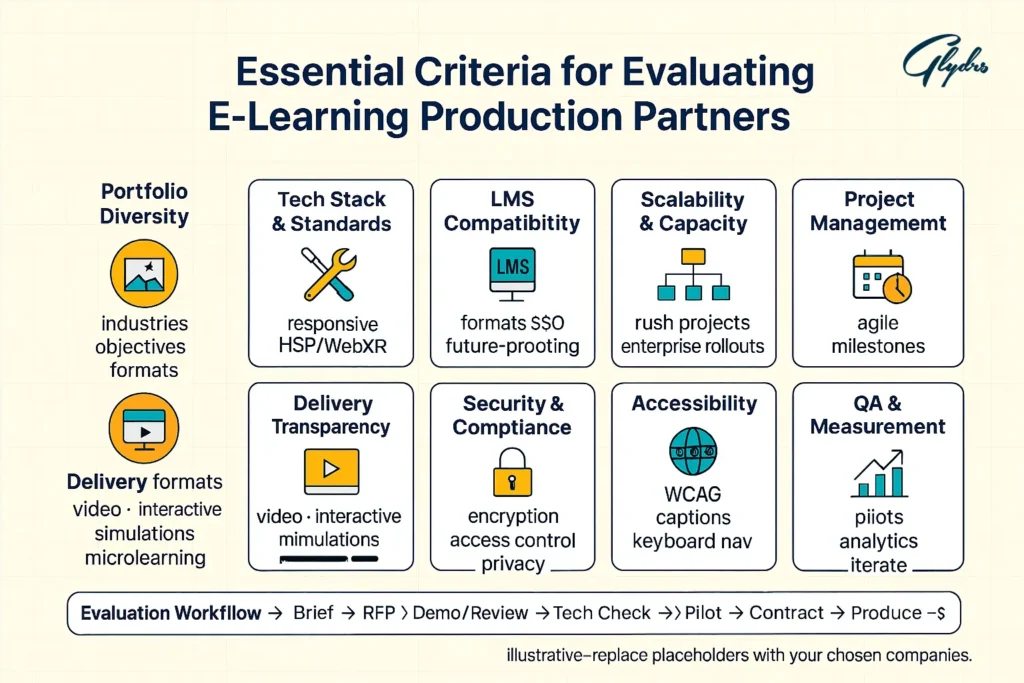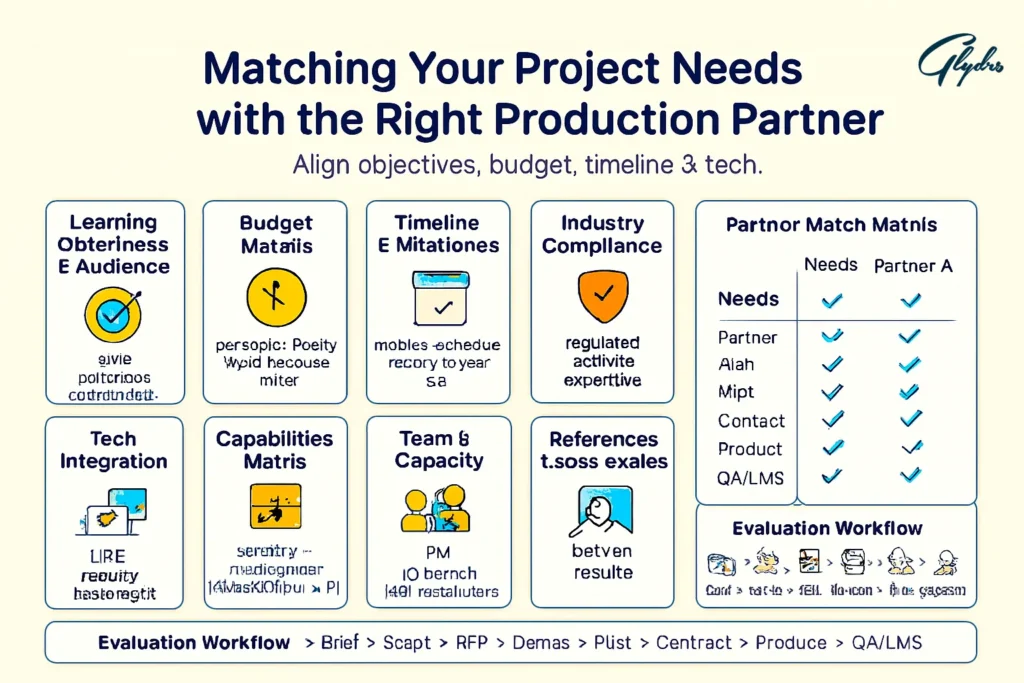
24 Sep Top 10 E-Learning Production Companies in the USA 2025
E-Learning Production Companies: The Best Choice This Year
You’re witnessing an unprecedented transformation in corporate learning. The e-learning production market has exploded to over $400 billion globally, with custom content development driving much of this growth. As you navigate the post-pandemic digital landscape, the demand for high-quality, engaging educational content has never been higher.
Unlike platform providers or learning management systems, e learning production companies specialize in creating the actual learning experiences your organization needs. These companies craft everything from interactive modules and video-based training to immersive simulations and microlearning content that drives real behavioral change.
What makes 2025 pivotal? You’re seeing artificial intelligence integration, personalized learning paths, and immersive technologies becoming standard expectations rather than luxury add-ons. The companies that can blend creative storytelling with cutting-edge technology while maintaining instructional design excellence are separating themselves from the pack.
What Separates Elite E-Learning Production Companies from the Rest
When you’re evaluating potential partners, you’ll want to look beyond flashy portfolios and marketing promises. The top-tier e learning production companies distinguish themselves through several core competencies that directly impact your training outcomes.
Technical innovation serves as the foundation, but it’s not just about having the latest tools. Elite companies demonstrate mastery across multiple authoring platforms, understand SCORM and xAPI standards inside and out, and can seamlessly integrate with your existing learning ecosystem. They’re already implementing AI-powered personalization and adaptive learning technologies that respond to individual learner behaviors.
Creative expertise paired with instructional design rigor sets the best apart from the rest. You’ll notice that leading companies employ certified instructional designers who understand adult learning principles, cognitive load theory, and engagement psychology. They don’t just make content look good – they architect learning experiences that stick.
Quality assurance processes reveal a company’s commitment to excellence. The best production partners use systematic review cycles, learner testing protocols, and iterative refinement based on actual performance data. They treat each project as a partnership in your success, not just a deliverable to complete.

Essential Criteria for Evaluating E-Learning Production Partners
Your evaluation process should dig deeper than surface-level impressions. Start by examining portfolio diversity – can they demonstrate success across different industries, learning objectives, and content types? The best companies showcase everything from compliance training that prevents violations to technical skills development that measurably improves performance.
Technology stack assessment reveals future-proofing capabilities. You want partners who work with responsive design frameworks, support multiple delivery formats, and stay current with emerging standards like H5P and WebXR. Their development processes should accommodate your specific LMS requirements while remaining flexible for future platform changes.
Scalability considerations become crucial as your organization grows. Can they handle rush projects when compliance deadlines loom? Do they have the creative and technical bandwidth to support enterprise-wide rollouts? The best production companies maintain strategic staffing levels and proven project management methodologies that scale with your needs.
Budget transparency separates professional partners from vendors who surprise you with scope creep. Look for companies that provide detailed cost breakdowns, explain their pricing models clearly, and offer options that align with your budget constraints without compromising quality.
The Top 10 E-Learning Production Companies: Leaders of 2025
Our comprehensive evaluation process examined over 50 companies across multiple criteria, including portfolio quality, client feedback, technical capabilities, innovation adoption, and proven results. We weighted factors based on real-world impact: does their content change behaviors and improve performance?
The ranking methodology prioritized companies that demonstrate consistent excellence across diverse projects, maintain strong client relationships evidenced by repeat business and referrals, and show clear innovation leadership in emerging technologies. We also considered geographic presence, industry specialization, and scalability to serve organizations of various sizes.
Companies 1-3: The Innovation Leaders
F.Learning Studio stands at the forefront of animated educational content creation, bringing eight years of specialized expertise to complex training challenges. You’ll appreciate their comprehensive approach that includes free consultation, animation demos, and content preparation samples that let you experience their quality before committing. Their client roster includes prestigious institutions like Stanford University and UNSW, reflecting their ability to handle sophisticated academic and corporate requirements.
Their service portfolio spans learning design, video production, interactive development, and graphic design – all integrated through a streamlined workflow that emphasizes clear communication at every stage. What sets them apart is their commitment to bespoke solutions that adapt to your specific objectives, industry requirements, and audience characteristics.
AllenComm has carved out a reputation for branded training programs that align seamlessly with corporate cultures and business objectives. Their 25+ years of experience show in their sophisticated approach to custom training solutions that go beyond traditional e-learning to create immersive, brand-centric learning experiences.
You’ll find their expertise particularly valuable for large-scale organizational change initiatives where training must reinforce cultural transformation. Their portfolio includes work with major brands like Lego and Nestle, demonstrating their ability to maintain brand consistency while delivering measurable learning outcomes.
ELB Learning brings innovation to the forefront with their comprehensive suite, including gamification, VR/AR capabilities, and custom content development. Their approach recognizes that engagement drives retention, and they’ve built their entire methodology around creating immersive learning experiences that learners want to complete.
Their technology integration capabilities shine when you need cutting-edge solutions that push beyond traditional e-learning boundaries. They excel at projects requiring multi-modal learning approaches and complex interactivity that adapts to learner choices and performance.
Companies 4-6: The Reliability Champions
CommLab India has built a global reputation over two decades of consistent delivery in rapid e-learning development, multilingual content creation, and legacy course conversions. You can rely on their proven processes for tight deadline projects while maintaining quality standards that meet international compliance requirements.
Their specialization in multilingual solutions makes them particularly valuable for global organizations needing consistent training experiences across diverse markets. Their experience with complex regulatory environments in healthcare, finance, and manufacturing translates to content that meets compliance objectives.
Learning Everest focuses on end-to-end custom learning experiences with particular strength in localization services. Their attention to cultural nuances and regional learning preferences makes them ideal partners when you’re expanding training programs internationally or serving diverse domestic populations.
You’ll appreciate their consultative approach that begins with a thorough needs analysis and continues through implementation support. Their project management methodology includes regular milestone reviews and stakeholder feedback integration that keeps projects on track and aligned with evolving requirements.
EI Design specializes in performance-focused learning solutions that tie directly to business outcomes. Their strategic approach goes beyond content creation to include performance support tools and learning consulting that helps you maximize training investment returns.
Their commitment to measurable results shows in their willingness to partner with clients on outcome tracking and continuous improvement. You’ll find their expertise particularly valuable when training must demonstrably impact key performance indicators or business metrics.
Companies 7-10: The Emerging Powerhouses
Acadecraft represents the new generation of production companies that leverage advanced content development tools while maintaining focus on educational effectiveness. Their diverse service portfolio spans K-12 through corporate training, giving them unique insights into learning preferences across age groups and contexts.
Their efficient development processes and customizable solutions make them particularly attractive for organizations needing high-quality content at competitive price points. They’ve optimized their workflows to deliver professional results without the premium pricing of legacy providers.
Novac Learning brings creative innovation to traditional training challenges through its expertise in mobile learning, AR/VR integration, and game-based learning approaches. Their technology-forward mindset positions them well for organizations ready to embrace next-generation learning modalities.
You’ll find their collaborative approach refreshing – they work as true partners in exploring how emerging technologies can solve your specific training challenges rather than pushing predetermined solutions.
ELearning Company offers full-service learning design and development with particular strength in software simulations and mobile learning applications. Their technical expertise extends to LMS integration and ongoing content maintenance that keeps your training current and functional.Upside Learning rounds out the list with its award-winning approach to creative e-learning solutions that emphasize learner engagement and practical application. Their global perspective and innovative design methodologies make them strong partners for organizations seeking differentiated training experiences.

Matching Your Project Needs with the Right Production Partner
Your project requirements should drive partner selection more than company reputation or marketing appeals. Start by clearly defining your learning objectives, target audience characteristics, technical constraints, and success metrics. Different e learning production companies excel in different areas, and the best match depends on your specific needs.
Budget planning requires understanding how production companies structure their pricing. Some use per-seat models, others charge by development hour, and many offer project-based pricing. The most transparent companies provide detailed breakdowns showing where your investment goes: instructional design, content creation, technical development, quality assurance, and project management.
Timeline considerations must account for both your launch requirements and the realities of quality content development. Rushed projects often result in compromised learning outcomes that require expensive revisions. The best production partners help you establish realistic timelines that balance urgency with effectiveness.
Industry-specific requirements add complexity that not all companies can handle effectively. Regulated industries like healthcare, financial services, and aviation have compliance requirements that demand specialized expertise. Look for production partners with demonstrable experience in your sector and an understanding of relevant regulations.
Technology integration planning prevents costly compatibility issues down the road. Your chosen partner should thoroughly understand your existing learning technology stack, including LMS capabilities, mobile requirements, bandwidth constraints, and accessibility standards. They should provide detailed technical specifications and integration testing protocols.
Keep reading and uncover secrets that can change the way you work. How to Use Animated Videos for E-Learning Effectively
2025 Trends Shaping E-Learning Production Excellence
Artificial intelligence integration is transforming content creation and personalization capabilities. The leading e learning production companies are implementing AI tools for automated content adaptation, intelligent tutoring systems, and predictive analytics that identify learners at risk of dropping out. You’ll see more companies offering AI-powered content recommendations and adaptive learning paths that adjust based on individual performance patterns.
Interactive and immersive learning experiences are becoming standard expectations rather than premium features. Virtual reality training simulations, augmented reality job aids, and interactive video scenarios are moving mainstream as production costs decrease and technology access increases. The companies positioning themselves as leaders are building expertise in these technologies while maintaining focus on learning effectiveness.
Microlearning and bite-sized content strategies reflect changing attention spans and workflow integration requirements. Modern learners prefer just-in-time learning that fits into busy schedules and provides immediate application opportunities. Production companies are developing content architectures that support both comprehensive learning journeys and individual performance support moments.
Mobile-first design has evolved from a nice-to-have to an essential requirement. With remote and hybrid work patterns permanently changing how people access training, production companies must optimize all content for mobile consumption while maintaining engagement and interactivity that traditionally required desktop experiences.
Keep reading and uncover secrets that can change the way you work. How to Choose the Right Video Production Company for Your Training Programs
Red Flags to Avoid When Selecting a Production Company
Pricing models that lack transparency often indicate hidden costs that will emerge as projects progress. Be wary of companies that provide vague estimates, refuse to explain their pricing structure, or seem reluctant to discuss potential additional charges. Professional production partners provide detailed breakdowns and clear change management processes.
Quality shortcuts reveal themselves in several ways: reluctance to provide samples, lack of revision cycles in their process, missing quality assurance steps, or inability to explain their instructional design methodology. Companies that focus primarily on visual appeal without discussing learning outcomes may create beautiful content that fails to achieve their objectives.
Communication breakdowns during the selection process predict project management problems later. Partners who are slow to respond, unclear in their explanations, or unwilling to adapt their communication style to your preferences will likely create frustration throughout development. The best companies demonstrate clear communication protocols and assign dedicated project managers.
Intellectual property concerns can create long-term complications if not addressed upfront. Ensure your production partner clearly explains ownership rights, usage permissions, and modification capabilities. Some companies retain ownership of custom content or charge additional fees for future updates, which can lock you into ongoing relationships on unfavorable terms.
Keep reading and uncover secrets that can change the way you work. Employee Training Video Production: Step-by-Step Guide
Your Roadmap to E-Learning Production Success in 2025
Your partner selection process should begin with internal stakeholder alignment on project objectives, success metrics, budget parameters, and timeline requirements. Document these requirements clearly before engaging potential partners – this foundation prevents scope creep and ensures proposals address your actual needs rather than what vendors want to sell.
Request detailed proposals that include project methodology, team composition, quality assurance processes, revision policies, and ongoing support options. The best production companies provide comprehensive project plans that demonstrate their understanding of your requirements and their approach to meeting them.
Contract negotiation should address intellectual property ownership, revision limits, timeline modifications, quality standards, and termination clauses. Professional partners expect these discussions and provide clear terms that protect both parties while ensuring project success.
Project kickoff success depends on establishing clear communication protocols, feedback processes, approval workflows, and milestone checkpoints. The best production partnerships feel collaborative from day one, with both parties working toward shared success rather than vendor-client relationships.
Success measurement requires defining metrics upfront and implementing tracking systems that capture both engagement data and learning outcomes. Work with your production partner to establish baseline measurements and ongoing assessment protocols that demonstrate return on investment.
Turn your goals into real achievements with our tailored services – request the service now.
Frequently Asked Questions (FAQ)
What’s the typical cost range for custom e-learning production in 2025?
Custom e-learning production costs vary significantly based on complexity, duration, and interactive elements. Basic courses typically range from $15,000 to $50,000 per finished hour, while advanced interactive content with simulations, branching scenarios, or VR elements can reach $100,000 to $300,000 per hour. Factors affecting pricing include graphic design complexity, video production requirements, assessment sophistication, and technical integration needs.
How long does it take to produce high-quality e-learning content?
Production timelines depend on content complexity and approval processes. Simple courses require 8-12 weeks from kickoff to delivery, while complex interactive content needs 16-24 weeks. Factors affecting the timeline include stakeholder availability for reviews, content complexity, number of revision cycles, and technical integration requirements. The best results come from realistic timeline planning that accommodates thorough quality assurance.
What file formats and technical specifications should I expect?
Professional production companies deliver content in multiple formats optimized for your specific requirements. Standard deliverables include SCORM 1.2 and 2004 packages for LMS compatibility, HTML5 output for mobile responsiveness, and source files for future modifications. Advanced projects may include xAPI (Tin Can) formats, WebXR files for immersive experiences, and native mobile applications.
How do I ensure the content will work with my existing LMS?
Compatibility verification requires early technical consultation between your production partner and the LMS administrator. Professional companies conduct compatibility testing throughout development, not just at the end. They should provide detailed technical specifications, conduct pilot testing with your actual LMS environment, and offer post-launch support for any integration issues that emerge.
What ongoing support should I expect after project completion?
Comprehensive production partnerships include 90-day post-launch support for technical issues, minor content updates, and performance optimization. Many companies offer extended maintenance agreements covering content updates, technology compatibility updates, and performance analytics support. Clarify support terms upfront to avoid unexpected charges for routine maintenance needs.
How do I measure the effectiveness of custom e-learning content?
Effective measurement requires establishing baseline metrics before launch and implementing tracking systems that capture both engagement and performance data. Leading production companies help design assessment strategies that measure knowledge retention, skill application, behavior change, and business impact. They often provide analytics consultation and reporting tools that demonstrate return on investment through quantifiable improvements in employee performance, compliance rates, or customer satisfaction scores.
Your Journey to E-Learning Excellence Starts Now
You’re equipped with comprehensive insights into the top e learning production companies shaping education and training in 2025. The digital learning landscape offers unprecedented opportunities to create engaging, effective content that drives real behavioral change and business results.
The companies highlighted in this guide represent the pinnacle of production excellence, each bringing unique strengths to different types of projects and organizational needs. Your success depends not just on choosing a reputable company, but on finding the right match for your specific requirements, culture, and objectives.
Take action now by defining your project requirements clearly, engaging multiple companies in detailed discussions. And requesting proposals that demonstrate their understanding of your unique challenges. The investment you make in selecting the right production partner will pay dividends in learner engagement. Knowledge retention, and measurable business outcomes.
Remember that the best e learning production companies view themselves as partners in your success, not just vendors completing transactions. Look for companies that ask probing questions about your objectives, challenge assumptions that might limit effectiveness. And demonstrate genuine interest in your long-term success.
Your organization’s learning and development future depends on the decisions you make today. Choose wisely. And your investment in custom e-learning content will drive sustained competitive advantage through a more skilled, engaged, and capable workforce.


No Comments